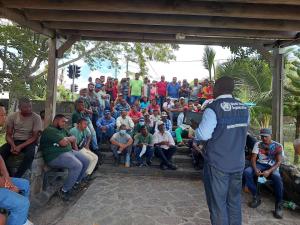WHO supports Mauritius as it grapples with first dengue outbreak
Dengue fever is having a moment. According to WHO data, cases worldwide increased significantly in 2023, following a small decline during the three previous years. A potent cocktail of ongoing transmissions and a surge in new cases saw the worldwide number of dengue cases exceed five million, a near record high. And although the lion’s share of the new cases has been reported in the Region of the Americas (almost 80%), the Aedes mosquito has transformed dengue into a truly global problem. Mauritius is a case in point.
Whilst it has experienced small, highly localized incidences of infections in the past, the country has never encountered a dengue outbreak of this scale. Between December 11, 2023, and March 19, 2024, the authorities had recorded 3,311 cases, while Rodrigues detected 1,363 cases during the same period. As of 19 March, there were 276 active cases in Mauritius and 156 Rodrigues. Four deaths have so far been attributed to dengue. The situation hasn’t been helped by the presence of enabling environmental factors, such as an especially wet summer.
As a tourism-oriented country Mauritius is understandably keen to address this public health issue in a decisive manner. WCO Mauritius has played a central role in supporting government’s efforts to stop the progression of the disease by adopting a two-pronged approach. The first is based on providing detailed data analysis for enhanced evidence-based decision-making, while the second is based on promoting more effective vector control activities.
As an active member of the inter-ministerial committee on dengue, WHO representative (WR), Dr Anne Ancia, is working with high-level authorities to mobilise resources, activities and services to slow the progression of dengue via effective vector control. To augment the country’s drive to tackle the dengue vector on the ground, WCO Mauritius has mobilized the services of three WHO experts: a Medical Officer (Malaria and Vector-Borne Disease Control), Dr Adiele Onyeze, and two entomologists, Jude Bigoga and Mawlouth Diallo. In addition, two epidemiologists and a specialist risk communication expert will be arriving soon.
Over the past three weeks, the experts have accompanied teams from various ministries (Health, Environment, Agro-Industry, Tourism, etc.) across the island on larviciding and fogging missions to observe the vector control programme in situ and provide actionable feedback. For example, the attractiveness of used tires as breeding grounds for mosquitos has been highlighted as a key driver of the outbreak. Education sessions are regularly conducted to ensure that the teams understand how the vector spreads and how best to eliminate its breeding sites.
In parallel, WCO Mauritius is conducting a study on the resistance of local Aedes population to insecticides to guide the utilization of the most effective and safest products. The team has supported the health authorities in devising strategies to reduce the populations of Aedes in both rural and urban communities and have taken stock of the country’s laboratory resources.
The Mauritius Country Office has also tapped into the WHO’s Contingency Fund for Emergencies to provide valuable equipment in support of the country’s struggle against dengue. This includes approximately 12,000 insect repellent sprays, 3,000 Insecticide Treated Mosquito Nets, 1,000 litres of K-Othrine, 25,000 rapid diagnostic tests and 5,000 respiratory masks for field workers. More materiel is on its way.
As Dr Ancia has made it clear time and again, defeating dengue fever will require the involvement of each and every Mauritian. For all the time and effort invested by the authorities in eradicating mosquito populations, it’s a logistical impossibility for them to clean up every single potential breeding site. And because flowerpots, tires and other receptacles that may attract Aedes mosquitos are everywhere, ultimately we are all on the frontlines of the fight against dengue.
Ultimately, turning the tide of dengue requires a collective commitment, be it in Mauritius or elsewhere.
